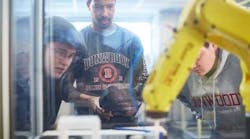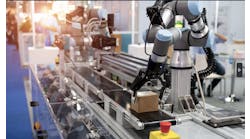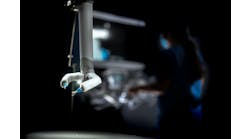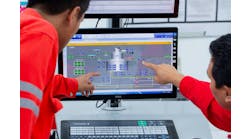Despite what you may have seen in science fiction movies, we’re a long way from the machines taking over. I recently toured a metal stamping and forming company and then, a few days later, a local medical-device manufacturer. Although these facilities have very different products and processes, they have one thing in common: the human hand rarely, if ever, touches the part. While that may seem like the first stage in robots taking over the world, nothing could be further from the truth. The more complex our machinery gets, the more our manufacturing industries need highly skilled 21st century technicians able to keep up.
Unfortunately, the reality is that there simply aren’t enough trained technicians to manage the machines that are already commonplace, not to mention the more complex production systems that will inevitably replace them in the future.
Through a sequence of automation that includes part probing, CNC machining, lasers, SCARA robotics, machine vision, automated guided vehicles (AGVs) and inspection, the raw materials of production or manufacturing processes enter one end of the building and leave the other end handled solely by intelligent machines. This means that technicians not only have to be highly trained, but also possess a breadth and level of expertise that is higher than it has been at any other time since the industrial revolution.
What then can and should be done? What do we need to do and understand to safeguard manufacturing processes while preparing our future workforce?
Flexible skill sets
The 21st century technician needs a highly flexible skill set that includes the ability to perform both preventive maintenance and corrective problem solving in the moment. Technicians need to think ahead and also react appropriately when urgent workplace issues arise.
A recent example comes to mind. At the local medical-device manufacturer I mentioned, the facilities management team had decided to change the fluorescent lighting in the production area and adopt more modern and efficient LED lights to reduce environmental impact and save money. They elected to shut down production for just a few hours while electricians changed out the lamps.
Unfortunately, when the system came back up, more than 50% of the work cells failed. The machine-vision-equipped SCARA robots could no longer see the part. All of these cells needed to be recalibrated for the change in lighting by technicians with the skill set to do it quickly in order to reduce the downtime.
Larger, more complex manufacturing ecosystems
Facilities that utilize AGVs have an even bigger problem going forward. Warehouses and fulfillment centers have quickly become filled with small robots moving around like bees in a beehive. A delicate balance of interfacing and interacting smart machines, all doing their jobs, is incredibly efficient but places the entire operation at high risk if any one component malfunctions or goes down.
The engineering involved in these kinds of systems has created a supply chain where you can order dog food and have it on your doorstep the same day. When drones fill the skies, as they soon will, the speed of delivery will become even faster. As time goes on, however, the maintenance needed to keep these systems operating at peak performance is critical. Technicians require a comprehensive knowledge of electromechanical systems in order to troubleshoot the myriad issues that might arise. That skill set includes, but is not limited to, electronic test equipment, ladder logic programming, electronic sensors, fluid power and mechanical power systems.
Engineer technicians in the classroom
With complex machinery, high-stakes production systems and continuing advancements in intelligent automation, we must evolve the way we teach our technicians to keep pace (Figure 1). We need to prepare a new wave of technicians with broad-based skills who are able to access deep and specialized knowledge and think critically in order to react appropriately to any issue on the production line or factory floor.
Figure 1: The new wave of technicians needs broad-based skills and the ability to access deep and specialized knowledge and think critically in order to react appropriately to any issue on the production line or factory floor.
This requires a blend of robust academic learning with hands-on experience in workplace environments. Only this will ensure that graduates and new technicians are ready the first day on the job.
It’s important for colleges and institutes of technology to work hand-in-hand with all kinds of industrial, engineering and robotic manufacturing employers to design curriculum that is experiential. The technologies and techniques that are taught need to be up to date and immune to aging and obsolescence by the time students leave college. Lastly, it’s equally important to ensure students have access to a broad base of learning opportunities that foster creative problem solving, critical thinking and analytical thought. Tomorrow’s very best technicians are doers and thinkers. For all their sophistication, robots still have to be told what to do.




